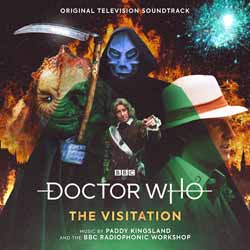|
Click here to return to the main site. Soundtrack Review
Beginning in 1975 with his score for The Changes, followed by The Hitchhiker’s Guide to the Galaxy in 1981 and 29 episodes of Doctor Who between 1980 and 1984, Paddy Kingsland’s synthesised keyboard fanfares became the sound of early 1980s TV that influenced future generations of musicians. “For many years, the incidental music for Doctor Who had been composed by Dudley Simpson, a prolific composer of TV music during the 1960s and ’70s. When John Nathan-Turner took over as producer in 1980, he wanted to create a new look and sound for the series, and decided to commission the Radiophonic Workshop to provide the incidental music. I was lucky enough to be involved in this,” recalls Kingsland. “It is curious listening to the music nearly 40 years later. It brings back so many memories of my times at the BBC, and I feel privileged to have been allowed to contribute something to a programme that has been enjoyed by so many people down the years…” The soundtrack to The Visitation was Paddy Kingsland’s first contribution to the nineteenth season of Doctor Who, and therefore his first work on a Peter Davison serial – though the musician’s next project, Castrovalva, would be transmitted first. The Visitation reunited Kingsland with director Peter Moffatt, with whom he had previously worked on Season 18’s State of Decay. In notes accompanying this release, the composer explains that, because most of the plot takes place near London more than 300 years in the past, “We decided early on that the music should have a period flavour, together with the usual high tech (at the time!) synthesiser sounds.” At times, the result sounds noticeably similar to Kingsland’s work on State of Decay. Witness the archaic pipes and clashing cymbals in the early track “Have You Seen the Sky?” This is perhaps not surprising, since both serials concern a primitive society that harbours an alien menace. There are also moments – in, for example, “Death in the Cellar” and “The End for us All” – that echo the musician’s spine-tingling plucked strings in Full Circle. “The score is quite sombre,” Kingsland continues, “although there are elements of ‘yea verily’ type music to set some scenes, which have a lighter texture. I played all the parts, using the synthesisers of the day, Oberheim, Roland and ARP, adding bass guitar plus drums and cymbals… not to mention my trusty Fender Mustang guitar.” The lighter tone is most evident in his jaunty themes for the eccentric highwayman Richard Mace and the local villagers, which are introduced in “Richard Mace & The Miller” and developed in numerous tracks, including “The Poacher and his Friends” and “Looking for the Miller”. Punchier elements come in towards the end of the soundtrack, in “The Sonic Booster” and the climactic “The Great Fire”, which set trends that Kingsland would explore further in Mawdryn Undead and Frontios, his final two contributions to Doctor Who, by which point he had left the BBC and gone freelance. In his notes, the composer recalls that Peter Moffatt “was my favourite Doctor Who director and was always enormously encouraging and positive. He was very experienced and had nothing to prove. He generously gave me the freedom to do my own thing, but always knew if something needed to be adjusted.” You can hear some of the things that needed adjusting in the final two tracks, which comprise unused variations of “Activation” (which accompanied the triggering of the Terileptils’ mind-controlled locals) and “Not Again!” (which underscored the end of Part Two). The original compositions are arguably less dramatic, owing to their use of the villager theme, which is downplayed in the more sinister broadcast versions. The Visitation is not my favourite Paddy Kingsland Doctor Who soundtrack (in my opinion, his work on Full Circle, Logopolis and Mawdryn Undead is superior), but this is still well worth revisiting. 7 Richard McGinlay Buy this item online
|
|---|

